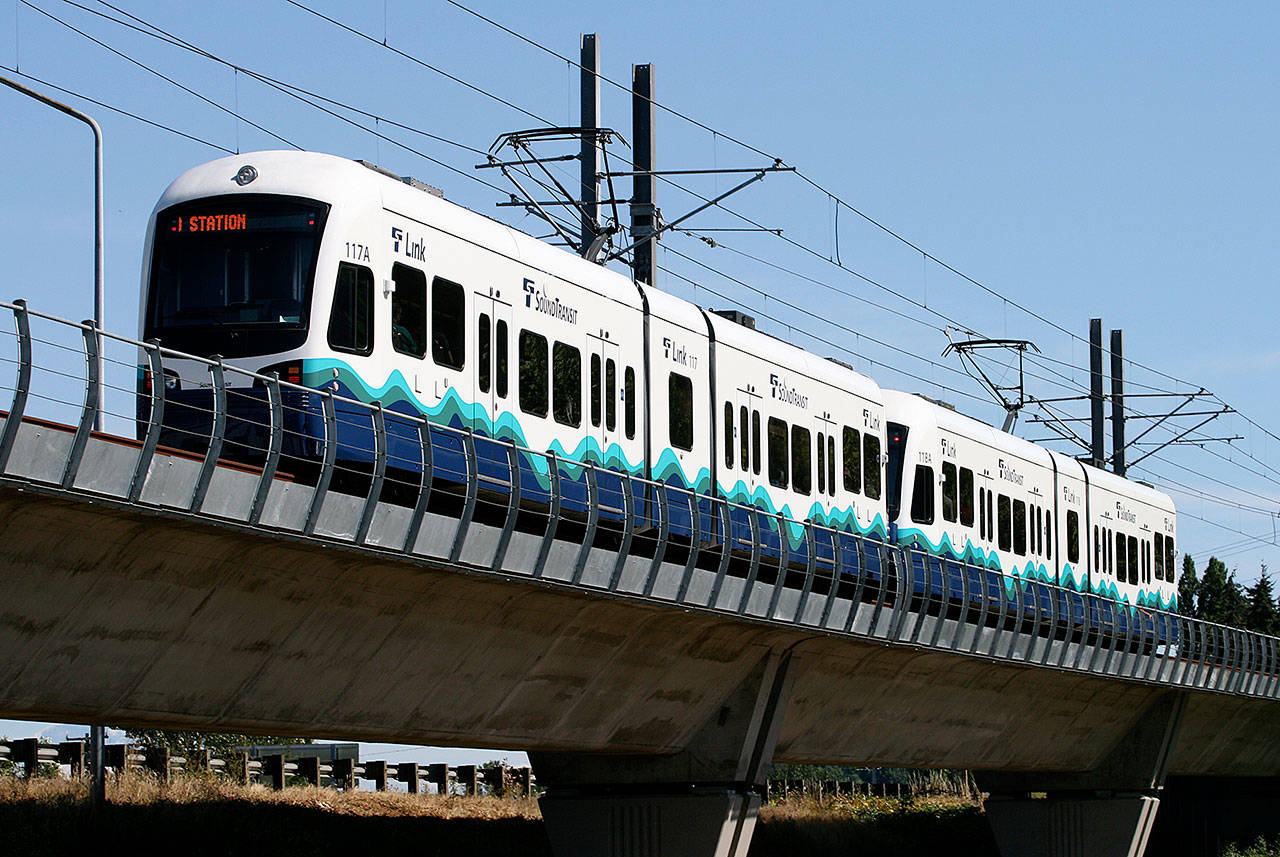EVERETT — Sound Transit is once again facing the loss of a billion dollars in federal funds counted on for its extension of light rail service into Lynnwood.
President Donald Trump on Monday called for axing a grant program from which the regional transit authority is seeking $1.17 billion for its Lynnwood Link Extension.
Trump is targeting the program in his proposed 2019 federal budget released Monday. He tried last year as well but Congress rebuffed him and preserved it.
Peter Rogoff, Sound Transit executive director, called it “highly disappointing” that the president continues to take aim at a program “that has worked well for decades.”
“I am hopeful Congress is going to push back and push back hard,” he said.
The amount sought by Sound Transit is a major chunk of the estimated $2.7 billion needed to expand light rail from Northgate to Lynnwood. The route includes stops in Shoreline and Mountlake Terrace.
Service is slated to start in 2024, a year later than originally projected, in part because of uncertainty surrounding how much federal funding would be available and when those dollars would arrive.
The Trump budget released Monday limits Federal Transit Administration capital investment grants, also known as the New Starts program, to projects with signed agreements in place.
That’s jeopardized funding for six transit projects in Washington that are in the pipeline, according to information from the office of U.S. Sen. Patty Murray. These are Sound Transit’s extensions to Lynnwood and Federal Way, three projects pursued by the city of Seattle and one by the Spokane Transit Authority.
Congress, in defiance of the president, passed a spending bill last May containing $100 million for the Lynnwood Link. Sound Transit, however cannot access those dollars until it secures an agreement with the transit administration for the entire $1.17 billion grant.
“Our goal is to get a full funding grant agreement for Lynnwood this year,” Rogoff said. If successful, it would prevent the project from slipping further behind schedule, he said.
That’s why Rogoff is once again looking to Congress for help. He was in Washington, D.C., last week meeting with Republican and Democratic lawmakers on the subject.
“I don’t sense any support for terminating the funding spigot for this kind of activity,” he said.
Also Monday, Trump released the blueprint of a plan he said will spur a $1.5 trillion investment into improving infrastructure throughout the nation.
It relies on $200 billion in federal funding, which is in his budget proposal, with the rest coming from local and state governments, special districts and private investors.
Murray issued a statement in which she called Trump’s plan “a bust.”
“Not only would it severely curtail federal help for future transportation projects in our state, it would shift the lion’s share of the costs to the states and to local communities—either by new tolls, taxes, or fees— all while trying to justify ways to roll back environmental and labor protections.”
The lack of federal dollars drew sharp criticism from Democratic Gov. Jay Inslee, who said states cannot “bear the burden” of repairing, replacing and modernizing infrastructure.
“Meaningfully investing in safe, and reliable infrastructure is a national imperative, and our state is more than doing its fair share,” Inslee said in a statement. “The president’s plan, unfortunately, abandons the federal government’s responsibility. His plan would essentially throw states a few Legos when what we really need is concrete and steel.”
There is one element in Trump’s infrastructure plan from which Sound Transit may be able to derive additional financial help, though it will come with a cost.
It is the Transportation Infrastructure Finance and Innovation Act (TIFIA) loan program which Trump wants to expand.
Sound Transit now has a Master Credit Agreement through which it has obtained four loans totaling $1.99 billion. One of those is for $657.9 million for the Lynnwood extension.
There’s a big difference between a loan, which must be paid back with taxpayer dollars, and a grant, which does not, Rogoff said. There’s also not enough detail on the infrastructure plan to understand the potential impacts compared to the budget where his intentions are clear.
‘This battle is going to be a long slog and this is another chapter in it,” he said.
Jerry Cornfield: 360-352-8623; jcornfield@herald net.com. Twitter: @dospueblos.
Talk to us
> Give us your news tips.
> Send us a letter to the editor.
> More Herald contact information.

























